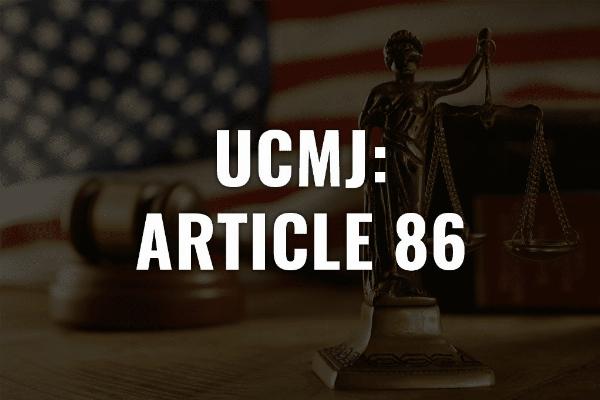Mitigating Factors in Article 86 UCMJ Cases: How to Build a Strong Defense

Strong 8k brings an ultra-HD IPTV experience to your living room and your pocket.
Article 86 of the Uniform Code of Military Justice (UCMJ) addresses Absence Without Leave (AWOL), a serious offense in the military that can lead to severe consequences. When a service member is charged under Article 86, the defense strategy often hinges on identifying and presenting mitigating factors. These factors can reduce the perceived severity of the offense and lead to more favorable outcomes. Understanding and effectively leveraging mitigating factors is crucial for building a strong defense in Article 86 UCMJ cases.
Understanding Article 86 UCMJ
Article 86 UCMJ specifies that any member of the armed forces who, without authority, fails to go to his appointed place of duty, goes from that place, or absents himself or remains absent from his unit, organization, or place of duty at which he is required to be shall be punished as a court-martial may direct. The punishments can range from non-judicial penalties to more severe consequences like confinement or dishonorable discharge, depending on the circumstances and duration of the absence.
The Importance of Mitigating Factors
Mitigating factors are circumstances that, while not excusing the offense, reduce its severity and suggest that the accused deserves a lighter sentence. In the context of Article 86 UCMJ, these factors can play a pivotal role in shaping the outcome of the case. They help to provide context and explain the reasons behind the absence, which can influence the judgment of the court-martial.
Common Mitigating Factors in Article 86 UCMJ Cases
Personal Hardship and Family Issues: Personal problems, such as severe illness in the family, unexpected crises, or other significant hardships, can be compelling mitigating factors. Demonstrating that the service member was facing an extraordinary personal challenge that contributed to their absence can elicit sympathy and understanding from the court.
Medical and Mental Health Conditions: Physical or mental health issues can significantly impact a service member's behavior and decision-making. If the accused was suffering from an untreated medical condition, mental health issue, or psychological disorder at the time of the absence, these can be powerful mitigating factors. Providing medical records, testimony from healthcare providers, and other documentation can support this defense.
Lack of Prior Disciplinary Issues: A previously unblemished service record can serve as a strong mitigating factor. If the service member has a history of exemplary conduct and no prior disciplinary actions, this can be used to argue that the AWOL incident was an anomaly rather than a pattern of behavior.
Operational Stress and Combat Fatigue: Service members often face extreme stress and fatigue, particularly those in combat zones or high-pressure assignments. Demonstrating that the absence was a result of overwhelming operational stress or combat fatigue can mitigate the perceived severity of the offense.
Attempts to Return: If the service member made genuine efforts to return to duty as soon as possible or attempted to notify superiors of their situation, this can be a mitigating factor. Evidence of intent to return and communication efforts can show that the absence was not a deliberate act of desertion.
Building a Strong Defense
Building a strong defense in Article 86 UCMJ cases requires a thorough understanding of the mitigating factors and the ability to present them effectively. Here are key steps in the process:
Gather Evidence: Collect all relevant evidence that supports the mitigating factors. This includes medical records, personal testimonies, affidavits from family members or colleagues, and any other documentation that can provide context to the absence.
Expert Testimony: Engage experts, such as medical professionals or mental health experts, to provide testimony about the service member’s condition and how it impacted their actions. Expert opinions can lend credibility to the defense.
Character Witnesses: Identify and prepare character witnesses who can attest to the service member's good conduct, reliability, and dedication. These witnesses can help paint a fuller picture of the accused’s character and history.
Legal Representation: Work with an experienced military defense attorney who understands the nuances of Article 86 UCMJ cases. A skilled attorney can help navigate the complexities of the military justice system, present the mitigating factors effectively, and advocate for a fair and just outcome.
Mitigating factors play a crucial role in Article 86 UCMJ cases, offering a path to a more favorable resolution by providing context and understanding to the accused’s actions. By thoroughly documenting and presenting these factors, service members can build a strong defense that highlights their circumstances, reduces the perceived severity of their offense, and ultimately leads to a fairer outcome.
Note: IndiBlogHub features both user-submitted and editorial content. We do not verify third-party contributions. Read our Disclaimer and Privacy Policyfor details.


